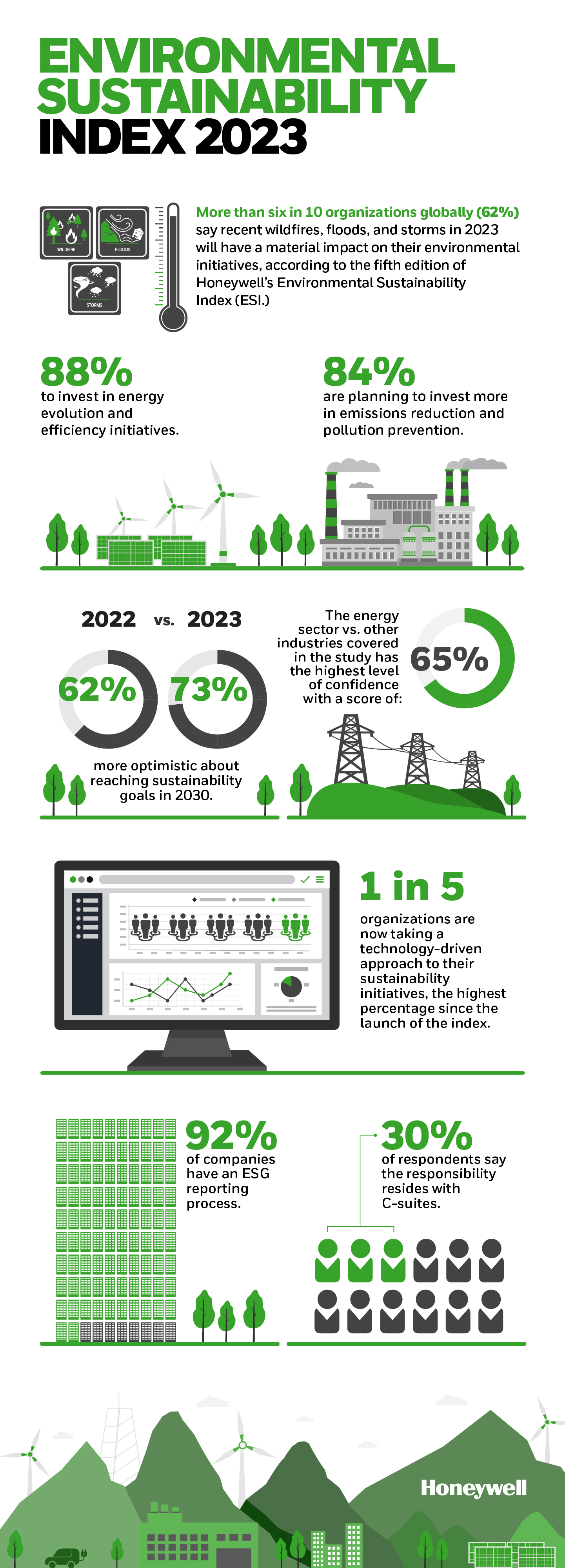
More than six in 10 organisations globally (62%) say recent wildfires, floods, and storms during 2023 will have a material impact on their environmental initiatives, according to the fifth edition of Honeywell’s Environmental Sustainability Index (ESI). Another 45% admit the extreme heat will have or has already had a material effect on their near-term plans. Compiled quarterly by Honeywell (NASDAQ: HON) and The Futurum Group, the ESI gauges movement in corporate sentiment and investment on the sustainability front.
“The extreme weather events this year have increased the sense of urgency for immediate action at organisations,” said Gavin Towler, Chief Scientist for Sustainability and Chief Sustainability Officer at Honeywell. “As a result, we should expect to see more organisations looking to accelerate their sustainability efforts and, in particular, adopting a technology-driven approach to their energy transition plans.”
The Honeywell Environment Sustainability Index (ESI) is produced quarterly in collaboration with The Futurum Group to track global shifts in corporate sentiment and sustainability investment. This is the fifth edition since the report’s inception in Q4’22, enabling year-over-year comparisons for the first time. The current installment also for the first time includes response data to questions on the likely impact of weather-related events on sustainability investment levels moving forward.

The findings shed light on the plans and progress made in sustainability efforts across regions and industry sectors:
- When asked to prioritise or rank current corporate initiatives, our panel of business professionals – all involved in Environmental Sustainability initiatives – cite achieving sustainability goals as prioritised ahead of digital transformation, market growth, and financial performance over the coming six months.
- Energy Evolution and Efficiency is considered the top sustainability priority over the coming six months, followed by Emissions Reduction, Pollution Prevention, and Circularity/Recycling initiatives. This trend remains unchanged from the previous two quarters.
- In this quarter, organisations continue to take a process-driven approach to their sustainability initiatives, but compared to last year, the number has decreased as more organisations take a balanced approach and tech-driven approach. Nearly one in five organisations are now taking a technology-driven approach to their sustainability initiatives – the highest percentage since the launch of the Index.
- Nearly nine in 10 (88%) organisations are planning to increase their budgets for energy evolution and efficiency initiatives.
- Overall optimism for achieving near-term and 2030 goals is increasing. Almost three-quarters (73%) of organisations are at least somewhat optimistic about achieving near-term goals, up from 62% a year ago. The energy sector shows the highest level of confidence among the industries covered in the study.
A majority of organisations believe that recent events like changes to oceans, extreme heat or cold, and weather-related natural disasters will impact their sustainability efforts. 62% of organizations believe that weather-related natural disasters will have a material impact on sustainability; 61% of organisations believe changes to the oceans will have a material impact on sustainability; 59 % of organisations believe that extreme heat or cold will have a material impact on sustainability.
- 35% of organisations indicated that weather-related natural disasters have already been a planning priority for near term sustainability investments. 27% indicated it likely will cause a change in planning or programs.
- Sustainability goals are perceived as the top corporate priority among this population, continuing an upward growth trajectory. It has been cited by 75% of organisations as one of their top five priorities. This up from 65% a year ago. Most organisations are prioritizing Energy Evolution and Efficiency over other Environmental Sustainability initiatives. However, compared to a year ago, organisations are prioritising the other categories at a higher rate. Companies in Asia Pacific are prioritising sustainability goals more than other regions.
- Ninety-two percent of respondents have an ESG reporting process in place, while 30% say the responsibility resides in the C-suite.
At least 90% of all organistions surveyed report they have been extremely successful or somewhat successful in achieving at least one or more of their Environmental Sustainability goals over the prior 12 months. Despite Energy Evolution and Efficiency being cited as the top Environmental Sustainability priority, Circularity & Recycling continues to be cited as initiative with the most extreme success over the past 12 months. This is echoes what was reported last year. Asia Pacific reports Extreme Success more than any other region in all categories except for Emissions Reduction where it is tied with North America.
Honeywell’s quarterly Index measures corporate sustainability commitment globally in aggregate. It also compiles data to gauge activity in four specific sustainability areas: energy evolution and efficiency; emissions reduction; pollution prevention; and circularity and recycling. The index further breaks down its findings by four regions (Asia Pacific, EMEA, Latin America and North America) and eight industry sectors (banking, consumer goods, energy, government/public sector, healthcare, technology, manufacturing/construction and transportation/logistics.)
Daniel Newman, CEO of The Futurum Group, said, “The data is showing that organisations in the public and private sectors are actively forming frameworks to partake in either policy-driven or investment and technological-oriented action in effort to address the global objectives in environmental sustainability.”
Methodology
The Environmental Sustainability Index is based on a global double-blind survey of 751 business, technology, and sustainability professionals directly involved in the planning, strategic development, implementation, or oversight of environmental sustainability goals and initiatives. Panelists were required to be in a leadership role within their organisation, with organisations required to have a minimum of 1,000 active employees. This survey was conducted during Q3 of 2023. The first edition of the survey was conducted during Q2 and Q3 of 2022; the second edition was conducted in Q4 of 2022; the third edition was conducted in Q1 of 2023 and the fourth edition was conducted in Q2 of 2023.
To download the full index and survey report, please visit here: Honeywell ESI.
About Honeywell
Honeywell (www.honeywell.com/newsroom) is an integrated operating company serving a broad range of industries and geographies around the world. The business is aligned with three powerful megatrends – automation, the future of aviation and energy transition – underpinned by our Honeywell Accelerator operating system and Honeywell Connected Enterprise integrated software platform.
About The Futurum Group
The Futurum Group (www.futurumgroup.com) is an independent research, analysis, and advisory firm, focused on digital innovation and market-disrupting technologies and trends. Every day its analysts, researchers, and advisors help business leaders from around the world anticipate tectonic shifts in their industries and leverage disruptive innovation to either gain or maintain a competitive advantage in their markets.
/articles/weather-related-natural-disasters-likely-impact-sustainability-initiatives